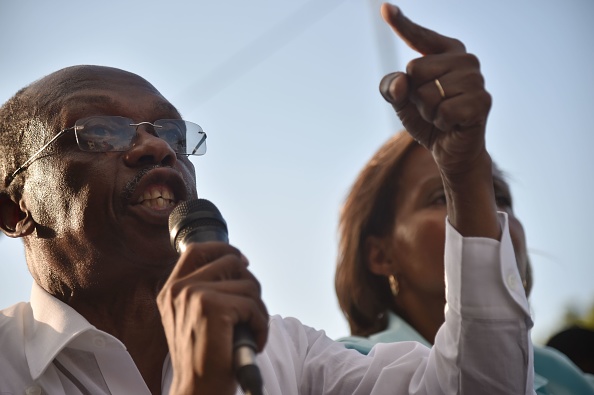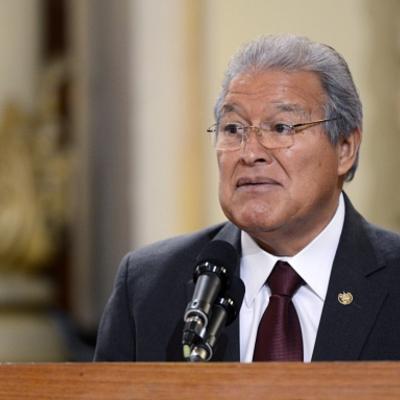What is Jean-Bertrand Aristide's Net Worth?
Jean-Bertrand Aristide is a former Salesian priest and politician who has a net worth of $100 million. Jean-Bertrand Aristide served as the first democratically elected president of Haiti. After being overthrown early in his presidency in the 1991 military coup, he completed his term from 1994 to 1996, and later served as president again from 2001 to 2004. Deposed for the second time in the 2004 coup, Aristide was forced into exile in South Africa; he returned to Haiti in 2011.
Early Life and Education
Jean-Bertrand Aristide was born on July 15, 1953 into poverty in Port-Salut, Sud, Haiti. Only three months old when his father passed away, he eventually moved to Port-au-Prince with his mother. At the age of five, Aristide began attending school with priests of the Salesian order. He later attended the Collège Notre-Dame in Cap-Haïtien, from which he graduated with honors in 1974. Aristide subsequently took a course of novitiate studies in the Dominican Republic. Returning to Haiti, he studied philosophy at the Grand Séminaire Notre Dame and psychology at the State University of Haiti.
Priesthood
In 1979, Aristide went to Europe to study theology. He returned to Haiti in 1982 to become ordained as a Salesian priest, and was appointed curate of a small parish in Port-au-Prince. A proponent of liberation theology, Aristide denounced Haiti's dictatorship, which was ruled by the Duvalier family at the time. With his criticism making him a target of the regime, the provincial delegate of the Salesian order sent Aristide into exile in Montreal, Canada, where he remained for three years. He returned to preaching in Haiti in 1985 as opposition to the Duvalier regime grew stronger among the public. That year, Aristide was appointed to St. Jean Bosco church. He soon began sponsoring weekly youth masses, and in 1986, founded an orphanage for street urchins. Due to his efforts to advance democracy in Haiti, Aristide remained a principal target for attack, and survived at least four attempts on his life.
Following the St. Jean Bosco massacre in 1988, in which Haitian paramilitary soldiers opened fire on the congregation and attacked fleeing parishioners with machetes, Aristide was ordered to leave Haiti by Salesian officials. However, tens of thousands of people protested, obstructing his access to the airport. Aristide was eventually expelled from the Salesian order on account of inciting "hatred and violence." He officially left priesthood in 1994.
First Presidential Term
Following a six-week campaign for the Haitian presidency, Aristide was elected in 1990 in what is considered the first honest democratic election in the country's history. However, eight months into his presidency, he was deposed in a military coup. After he was ousted, a campaign of terror against his supporters was launched by death squad leader and CIA informant Emmanuel Constant. Forced into exile, Aristide first went to Venezuela before ending up in the United States.
In the US, President Clinton promised to return Aristide to Haiti. Following large pro-Aristide demonstrations by Haitian expats, as well as significant international pressure, Clinton deployed US troops in Haiti as the country's military regime backed down. Aristide was subsequently returned to the Haitian presidency in October of 1994 to finish his term. The next year, he founded the social-democratic political party Fanmi Lavalas, which was soon renamed the Struggling People's Organization.

HECTOR RETAMAL/AFP/Getty Images
Second Presidential Term
In 2000, Aristide won a second presidency in the election. During his second term, it was alleged that he increasingly used street gangs to enforce his power and terrorize his political rivals. Following the murder of gang leader Amiot Métayer in 2003, Métayer's supporters targeted the president, believing he had ordered the murder. In 2004, rebel forces escalated their campaign, eventually invading the capital and deposing Aristide. Amid the chaos, Aristide and his family were flown out of Haiti to Jamaica. After spending several months there, the family relocated to South Africa.
Political Accomplishments
During his presidency, Aristide oversaw many reforms to Haitian society. His government helped increase access to health care and education; bolster protections for people accused of crimes; promote civil liberties; double the minimum wage; build low-cost housing; and support small farmers and fishermen. Along with René Préval, Aristide built 195 new primary schools and 104 new secondary schools, and provided thousands of scholarships to children. In terms of health care, Aristide oversaw the establishment of a successful AIDS prevention and treatment program. Among his other notable accomplishments as president, he launched the first trials of paramilitary death squads, successfully jailing many of their members and wealthy financiers.
Criticisms
Although he pushed for democracy and civil liberties, Aristide allegedly engaged in some human rights abuses as president. Human Rights Watch accused the Haitian police force under him of attacking opposition activists, something he appeared to encourage in his speeches. Aristide was also accused of corruption due to his government's alleged deals with various corporations.
Post-Exile
After around seven years in exile, Aristide returned to Haiti in 2011. At first, he abstained from getting back into politics. In 2014, Aristide was placed under house arrest during a corruption investigation. A couple years later, he returned to electioneering, touring Haiti to promote candidates from the Fanmi Lavalas party.
Personal Life
In early 1996, Aristide married lawyer Mildred Trouillot. They have two daughters together.








